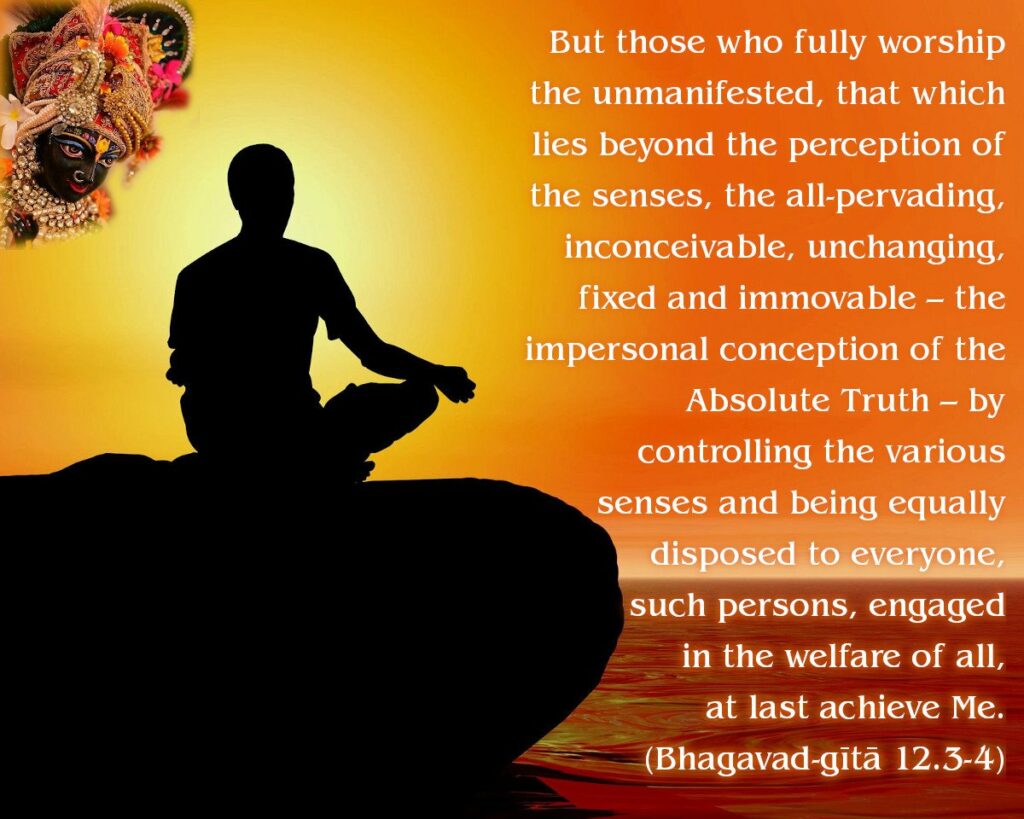ये त्वक्षरमनिर्देश्यमव्यक्तं पर्युपासते |
सर्वत्रगमचिन्त्यञ्च कूटस्थमचलन्ध्रुवम् || 3||
सन्नियम्येन्द्रियग्रामं सर्वत्र समबुद्धय: |
ते प्राप्नुवन्ति मामेव सर्वभूतहिते रता: || 4||
ye tv akṣharam anirdeśhyam avyaktaṁ paryupāsate
sarvatra-gam achintyañcha kūṭa-stham achalandhruvam
sanniyamyendriya-grāmaṁ sarvatra sama-buddhayaḥ
te prāpnuvanti mām eva sarva-bhūta-hite ratāḥ
ye—who; tu—but; akṣharam—the imperishable; anirdeśhyam—the indefinable; avyaktam—the unmanifest; paryupāsate—worship; sarvatra-gam—the all-pervading; achintyam—the unthinkable; cha—and; kūṭa-stham—the unchanging; achalam—the immovable; dhruvam—the eternal; sanniyamya—restraining; indriya-grāmam—the senses; sarvatra—everywhere; sama-buddhayaḥ—even-minded; te—they; prāpnuvanti—attain; mām—Me; eva—also; sarva-bhūta-hite—in the welfare of all beings; ratāḥ—engaged
Translation:
Those who, having restrained well all the senses, even-minded everywhere, rejoicing in the welfare of all beings, meditate on the indefinable, eternal, all-pervading, and Imperishable Brahman – they attain Me alone.
Commentary:
One Paramatma is both with form and without form (Saguna and Nirguna), and so the goal of both forms of worship is the same. Whatever may be the method of worship, if it is practised with faith and devotion, man reaches Paramatma. These two verses deal with persons who seek Nirguna Para Brahmam. This first verse states the attributes of the Imperishable Brahman and the second the qualities necessary for the aspirant for such realisation. Even though the seeker carries on his meditation on the formless Brahman, yet, if he does not possess purity of mind, self-restraint, equanimity, and love for all beings, his effort does not yield the desired results. Without these qualities of good character, realisation of Brahman is impossible. His worship will be like depositing good and relishing eatables in an impure vessel. All of them become corrupt and contaminated by the impurities of the vessel. Both the paths of realisation require the above qualities of character. Therefore the Lord mentions the three indispensable qualities of the aspirant in this context.
- Complete self-restraint,
- Equal-mindedness,
- Universal love.
The seekers should cultivate these three qualities well while carrying on their method of worship. Here the word ‘Samniyamya’ is used to emphasise complete control of all the senses; the word ‘Sarvatra’ emphasises equanimity at all times and under all circumstances, and ‘Sarvabhutahiteratah’ emphasises love for all beings without any distinction whatsoever. Thus meditating, the seeker attains the Lord undoubtedly. Let all the seekers examine themselves how far they have acquired these basic virtues.
Sri Ramakrishna Says — “Sarv bhuta hite ratah” (सर्वभूतहिते रता)
Keshab began to serve some puffed rice and grated coconut. The guests held these in the folds of their wearing-cloths and presently started to eat. Everyone was joyful. The Master noticed, however, that Keshab and Vijay rather shrank from each other, and he was anxious to reconcile them.
MASTER (to Keshab): “Look here. There is Vijay. Your quarrel seems like the fight between Siva and Rama. Siva was Rama’s guru. Though they fought with each other, yet they soon came to terms. But the grimaces of the ghosts, the followers of Siva, and the gibberish of the monkeys, the followers of Rama, would not come to an end! (Loud laughter.) Such quarrels take place even among one’s own kith and kin. Didn’t Rama fight with His own sons, Lava and Kusa? Again, you must have noticed how a mother and daughter, living together and having the same spiritual end in view, observe their religious fast separately on Tuesdays, each on her own account — as if the welfare of the mother were different from the welfare of the daughter. But what benefits the one benefits the other. In like manner, you have a religious society, and Vijay thinks he must have one too. (Laughter.) But I think all these are necessary. While Sri Krishna, Himself God Incarnate, played with the gopis at Vrindavan, trouble-makers like Jatila and Kutila appeared on the scene. You may ask why. The answer is that the play does not develop without trouble-makers. (All laugh.) There is no fun without Jatila and Kutila. (Loud laughter.)
“Ramanuja upheld the doctrine of Qualified Non-dualism. But his guru was a pure non-dualist. They disagreed with each other and refuted each other’s arguments. That always happens. Still, to the teacher the disciple is his own.”
All rejoiced in the Master’s company and his words.
Related Articles:
- Sages whose sins are destroyed, whose dualities are torn asunder, who are self-controlled, who rejoice in the well-being of others, attain union with Brahman (Moksha). (BG 5.25)
Bhagavad Gita: Chapter 12 🔻 (20 Verses)
